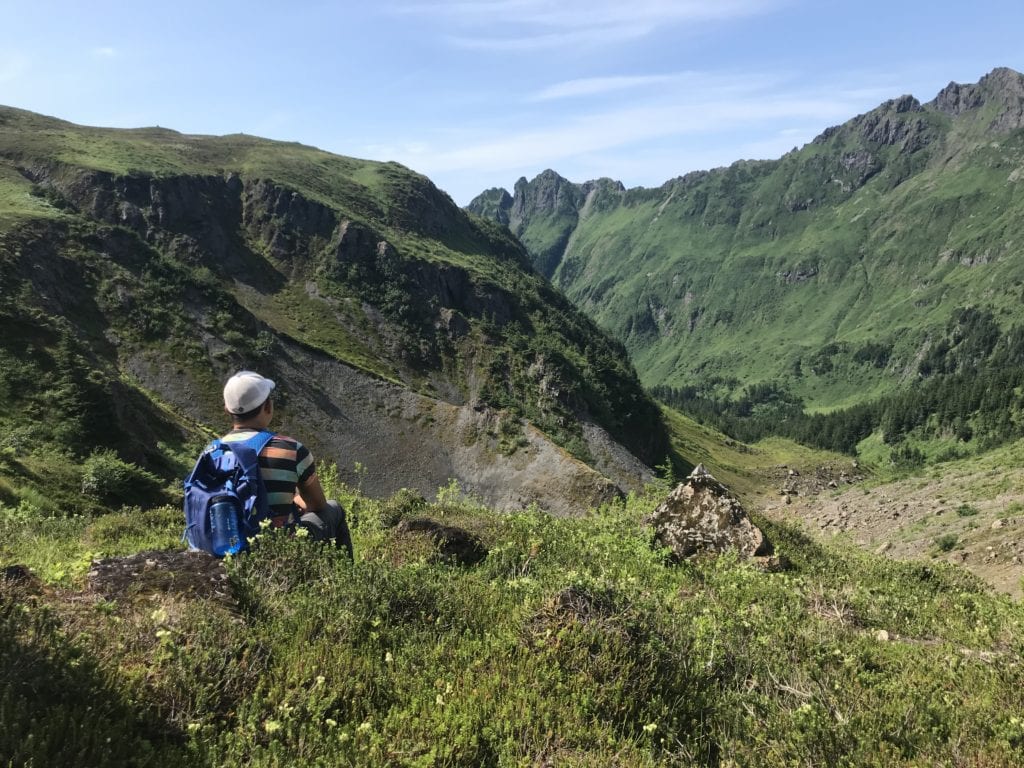
The theme for this year’s Copper River Stewardship Program was “Stories in the Landscape.” We wanted to learn about the dramatic geology of the Copper River Watershed and also share stories with each other and with the people we met along the way. Six high school students from Cordova and three from the Copper River Basin spent 10 days in July traveling all over the watershed together.
Their adventures included hiking Sheridan Mountain to get an impressive perspective of a watershed, wading up to their chests in the ponds of the Copper River Delta as they helped U.S. Forest Service Cordova Ranger District staff maintain Dusky Canada Goose nest islands, trekking into the jagged remains of a volcano in Wrangell-St. Elias National Park near the headwaters of the Copper River, and much more.
As they got to know each other early in the program, the students wrote personal poems trying to answer the question, “Where are you from?” This can be a complicated question, since we are shaped by places, people and the events of our lives. The students pulled upon memories and experiences to complete a template developed by Alaska Poet Laureate Earnestine Hayes to create their poems.
Braden Beckett, Cordova Steward
I am from the Copper River Delta, from the misty rain forests and great outdoors.
I am from the great outback where beasts live.
I am from the magical jungle of the north.
I remember the moose imprints and the stories they could tell you, and the adventures they left behind.
I stand for those who are the protectors, and the ones they guard.
I am from the water that fills our lakes, to the rain that blesses our land. I am from the Copper River Delta.
‘The tree I am growing,’ by Autumn Deaton, Cordova Steward
I am planted from a beautiful romance, and baby steps in cool grass.
I am watered.
There is no bad day and tears don’t need to be saved.
I grow from the second star away and the cool evenings in May.
The voice of a bird, and the constant rain.
I am growing from the yearn of tomorrow, and today’s lovely memories.
I am the tree still, growing and budding new leaves.
The students travelled across Prince William Sound on the ferry, Aurora, and read first-person stories about the Exxon Valdez Oil Spill in the book “The Spill.” As they looked out on the blue water, rocky beaches and lush hills, the stories brought to life a time when these waters were a place of tragedy. To help process the painful personal experiences, they created drawings and wrote letters putting themselves in the shoes of the oil spill responders.
Later in the trip, we gathered at the Viking Lodge, a Wrangell-St. Elias National Park Public Use Cabin on the Nabesna Road. As rain pelted down outside, the students and adult leaders shared more stories based on their lives, prompted by the color of the M&M’s they grabbed out of a bag. Blue stands for water, red for an embarrassing story, etc. The hilarious round of storytelling that ensued included answering the door in your underwear, rescuing a sparrow nest from the lawnmower, and a somewhat bungled but ultimately successful ice-skating marriage proposal.
The next day we met with Elder Wilson Justin at his camp. We were surprised to learn that some of the traditional stories of his people can take days to tell. Wilson wove together stories from his childhood at Nabesna, his gradual enlightenment as a traditional healer, and his work as an advocate for the environment and traditional values. He asked the students to see the coming changes and challenges as a chance for uplifting, just as the geologic action of the earth brings chaos but also builds mountains.
That afternoon, we hiked up into the mist on the Skookum Volcano trail, finding stories of eruptions, landslides and metamorphosis in the dramatic landscape. Luckily, we had some visiting geologists along to help us read the clues. The students were asked to find an interesting rock and get to know it. Back at the cabin, we wrote the story of our rocks. Some stuck to geologic details, while others gave their rocks names and complicated personal lives.
This program was a wonderful reminder of the power of stories in our lives. They help us learn about each other, inspire and enlighten.
Copper River Stewardship Program is organized by a partnership including WISE, Prince William Sound Science Center, Copper River Watershed Project, Wrangell-St. Elias National Park, US Forest Service Cordova Ranger District and U.S. Bureau of Land Management Glennallen Field Office. A huge thanks to Prince William Sound Regional Citizens Advisory Council, Alyeska Pipeline Service Company, AT&T, Oil Spill Recovery Institute, Conoco and BP for providing funding.
Robin Mayo is executive director of Wrangell Institute for Science and Environment.





